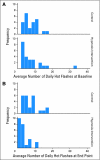Randomized trial of a hypnosis intervention for treatment of hot flashes among breast cancer survivors
- PMID: 18809612
- PMCID: PMC2652097
- DOI: 10.1200/JCO.2008.16.6389
Randomized trial of a hypnosis intervention for treatment of hot flashes among breast cancer survivors
Abstract
Purpose: Hot flashes are a significant problem for many breast cancer survivors. Hot flashes can cause discomfort, disrupted sleep, anxiety, and decreased quality of life. A well-tolerated and effective mind-body treatment for hot flashes would be of great value. On the basis of previous case studies, this study was developed to evaluate the effect of a hypnosis intervention for hot flashes.
Patients and methods: Sixty female breast cancer survivors with hot flashes were randomly assigned to receive hypnosis intervention (five weekly sessions) or no treatment. Eligible patients had to have a history of primary breast cancer without evidence of detectable disease and 14 or more weekly hot flashes for at least 1 month. The major outcome measure was a bivariate construct that represented hot flash frequency and hot flash score, which was analyzed by a classic sums and differences comparison. Secondary outcome measures were self-reports of interference of hot flashes on daily activities.
Results: Fifty-one randomly assigned women completed the study. By the end of the treatment period, hot flash scores (frequency x average severity) decreased 68% from baseline to end point in the hypnosis arm (P < .001). Significant improvements in self-reported anxiety, depression, interference of hot flashes on daily activities, and sleep were observed for patients who received the hypnosis intervention (P < .005) in comparison to the no treatment control group.
Conclusion: Hypnosis appears to reduce perceived hot flashes in breast cancer survivors and may have additional benefits such as reduced anxiety and depression, and improved sleep.
Figures
Comment in
-
Breast cancer survivors and hot flashes: the search for nonhormonal treatments.J Clin Oncol. 2008 Nov 1;26(31):5008-10. doi: 10.1200/JCO.2008.18.2170. Epub 2008 Sep 22. J Clin Oncol. 2008. PMID: 18809600 No abstract available.
References
-
- Ganong W: Menopause, in: Review of Medical Physiology. Norwalk, CT, Appleton and Lange, 1993, pp 384-396
-
- Carpenter JS: The Hot Flash Related Daily Interference Scale: A tool for assessing the impact of hot flashes on quality of life following breast cancer. J Pain Symptom Manage 22:979-989, 2001 - PubMed
-
- Lamb MA: Effects of cancer on the sexuality and fertility of women. Semin Oncol Nurs 11:120-127, 1995 - PubMed
-
- Carpenter JS, Andrykowski MA, Cordova M, et al: Hot flashes in postmenopausal women treated for breast carcinoma: Prevalence, severity, correlates, management, and relation to quality of life. Cancer 82:1682-1691, 1998 - PubMed
-
- Loprinzi CL, Michalak JC, Quella SK, et al: Megestrol acetate for the prevention of hot flashes. N Engl J Med 331:347-352, 1994 - PubMed
Publication types
MeSH terms
Substances
Grants and funding
LinkOut - more resources
Full Text Sources
Medical




